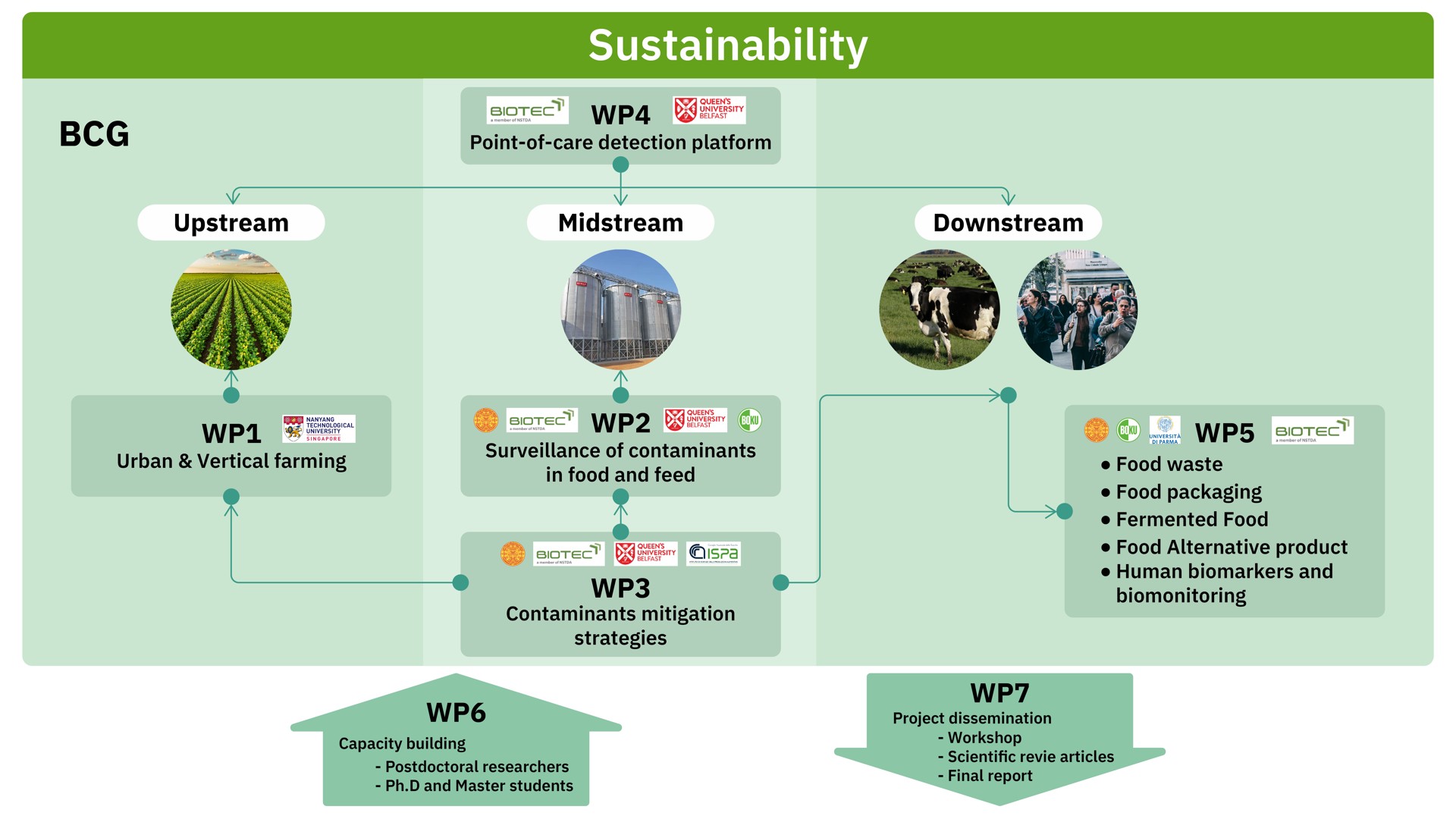Mycotoxin

Overview
This research aims to tackle and mitigate mycotoxin problems in this region in order to provide food and health security to the ASEAN, European and global consumers, which is one of Strategic Commons of Thailand Post COVID-19. Adding to the complex issues of mycotoxins, the changing climate as well as the global coronavirus pandemic undoubtedly complicate the issue in term of food security even further. The effects of the global coronavirus pandemic are not short term and will last for a number of years at least. No one country has the all of the resources or expertise to address mycotoxin issue alone, thus it needs international cooperation to utilize scientific talents and cutting-edge research facilities. Thus, the formation of an ASEAN network will play a critical role in address this issue by supporting the development of urgent and impactful strategies to help sample, monitor and detect food safety issues as well as issues such livestock performance which help underpin the economics of the region.
Aim & Scope
- To investigate and monitor the effect of climate change on fungal growth and mycotoxin contamination level in ASEAN agricultural commodities.
- To develop innovative biological mycotoxin binder(s) for migrating mycotoxin exposure in farm animals and humans.
- To develop a novel point-of-care platform for detection of multi-mycotoxin and emerging mycotoxin
- To evaluate the health risk of mycotoxins in ASEAN populations.
- To increase the number of publications on mycotoxins in the ASEAN region.
- To evaluate the mycotoxin situation/status within this region in order to improve ASEAN economy and consumer health.
- To share knowledge and experience across boundaries among EU and ASEAN researchers and scientists
On-going projects
- Surveillance of mycotoxins and emerging mycotoxins in agricultural commodities in Thailand and ASEAN
- Innovative mycotoxin binder from agricultural wastes
- MycoSMART diagnostic tool
- Mycotoxins biomonitoring in Thai population.
Research outputs
Publications
- Anal, A.K., Perpetuini, G., Petchkongkaew, A., Tan, R., Avallone, S., Tofalo, R., Nguyen, H.V., Chu-Ky, S., Ho, P.H., Phan, T.T., Waché, Y. 2019. Food safety risks in traditional fermented food from South-East Asia. Food Control. 109. March 2020. 106922.
- Licandro, H., Ho, P.H., Nguyen, T.K.C., Petchkongkaew, A., Nguyen, H.V., Chu-Ky, S., Nguyen, T. V. A., Lorn, D., Waché, Y. 2019. How fermentation by lactic acid bacteria can address safety issues in legumes food products? Food Control. 110. April 2020. 106957.
- Adunphatcharaphon, S. and Petchkongkaew, A. 2020. Zearalenone. Thai Science and Technology Journal. 28(12): 2201-2216.
- Adunphatcharaphon, S., Petchkongkaew, A., Greco, D., D’Ascanio, V., Visessanguan, W., and Avantaggiato, G. 2020. The Efficiency of Durian Peel as Multi-Mycotoxin Adsorbents. Toxins. 2020, 12, 108. DOI:10.3390/toxins12020108.
- Watanakij, N., Visessanguan, W., and Petchkongkaew, A. 2020. Aflatoxin B1 Degrading-Activity from Bacillus subtilis BCC 42005 Isolated from Fermented Cereal Products. Submitted to Food Additives and Contaminants: Part A. 37(9): 1579-1589. DOI: 10.1080/19440049.2020.1778182.
- Chibuzor-Onyema, I.E., Ezeokoli, O.T., Sulyok, M., Notununu, I., Petchkongkaew, A., Elliott, C.T., Adeleke, R.A., Krska, R., and Ezekiel, C.N. 2021. Metataxonomic Analysis of Bacterial Communities and Mycotoxin Reduction during Processing of Three Millet Varieties into Ogi, a Fermented Cereal Beverage. Food Research International. 2021, 143, 110241. DOI: 10.1016/j.foodres.2021.110241.
- Awapak, D., Petchkongkaew, A., Sulyok, M., and Krska, R. 2021. Co-Occurrence and Toxicological Relevance of Secondary Metabolites in Dairy Cow Feed from Thailand. Food Additives & Contaminants: Part A. DOI: 10.1080/19440049.2021.1905186.
- Adunphatcharaphon, S., Petchkongkaew, A., and Visessanguan, W. 2021. In Vitro Mechanism Assessment of Zearalenone Removal by Plant-Derived Lactobacillus plantarum BCC 47723. Toxins. 13, 286. DOI: 10.3390/toxins13040286.
- Perpetuini, G., Chuenchomrat, P., Pereyron, V., Haure, M., Lorn, D., Quan, L.-H., Ho, P.-H., Nguyen, T.-T., Do, T.-Y., Phi, Q.-T., Nguyen, T.K.C., Licandro, H., Son, C.-K., Tofalo, R., Kasikonsunthonchai, W., Adunphatcharaphon, S., Petchkongkaew, A. and Waché, Y. 2021. Microorganisms, the Ultimate Tool for Clean Label Foods? Inventions. 6, 31. DOI: 10.3390/inventions6020031.
- Kolawole, O., Meneely, J., Petchkongkaew, A., and Elliott, C. 2021. A review of mycotoxin biosynthetic pathways: associated genes and their expressions under the influence of climatic factors. Fungal Biology Reviews. 37. 8-26. DOI: 10.1016/j.fbr.2021.04.003.
- Kasikornsunthornchai, W., Petchkongkaew, A., and Adunphatcharaphon, S. 2021.
Accepted. Thai Science and Technology Journal. - McVey, C., Elliott, C.T., Cannavan, A., Kelly, S.D., Petchkongkaew, A., and Haughey, S.A., 2021. Portable spectroscopy for high throughput food authenticity screening: Advancements in technology and integration into digital traceability systems. Trends in Food Science & Technology. 118. 777-790. https://doi.org/10.1016/j.tifs.2021.11.003.
- Adunphatcharaphon, S., Elliott, C.T., Sooksimuang, T., Charlermroj, R., Petchkongkaew, A., and Karoonuthaisiri, N. 2022 The evolution of multiplex detection of mycotoxins using immunoassay platform technologies. Journal of Hazardous Materials. 432. 128706.
- Siri-anusornsak, W.; Kolawole, O.; Mahakarnchanakul, W.; Greer, B.; Petchkongkaew, A.; Meneely, J.; Elliott, C.; Vangnai, K. The Occurrence and Co-Occurrence of Regulated, Emerging, and Masked Mycotoxins in Rice Bran and Maize from Southeast Asia. Toxins. 14. 567. https://doi.org/10.3390/ toxins14080567.
- Owolabi, I., Kolawole, O., Jantarabut, P., Elliott, C., and Petchkongkaew, A. 2022. The importance and mitigation of mycotoxins and plant toxins in Southeast Asian fermented foods. npj Science of Food. Manuscript accepted.
Patents & petite-patents
- อวันวี เพชรคงแก้ว และ บุญพา ภิญโญวรโชติ. สิทธิบัตรการประดิษฐ์ “กรรมวิธีในการสกัดสารออกฤทธิ์จากเห็ดหอม (Lentinus edodes) เพื่อยับยั้งการเจริญเติบโตของเชื้อราที่สร้างสารพิษ” เลขที่คำขอ 1401004596.
- อวันวี เพชรคงแก้ว และ บุญพา ภิญโญวรโชติ. สิทธิบัตรการประดิษฐ์ “กรรมวิธีในการสกัดสารออกฤทธิ์ทางชีวภาพจากเห็ดหอมเพื่อใช้ในการยับยั้งการสังเคราะห์สารพิษ Fumonisin B1 ที่ผลิตจากเชื้อรา Fusarium verticillioides” เลขที่คำขอ 1401006221.
- อวันวี เพชรคงแก้ว เสาวลักษณ์ อดุลพัชราภรณ์ และ วรรณพ วิเศษสงวน. อนุสิทธิบัตรการประดิษฐ์ “กรรมวิธีในการผลิตตัวดูดจับสารพิษจากราในอาหารสัตว์โดยใช้เปลือกทุเรียน” เลขที่คำขอ 1903003030.
Others
2 Exchange students (1 Master and 1 Bachelor) and 2 Postdoctoral researchers
